The AMD Radeon VII Review: An Unexpected Shot At The High-End
by Nate Oh on February 7, 2019 9:00 AM ESTBattlefield 1 (DX11)
Battlefield 1 returns from the 2017 benchmark suite, the 2017 benchmark suite with a bang as DICE brought gamers the long-awaited AAA World War 1 shooter a little over a year ago. With detailed maps, environmental effects, and pacy combat, Battlefield 1 provides a generally well-optimized yet demanding graphics workload. The next Battlefield game from DICE, Battlefield V, completes the nostalgia circuit with a return to World War 2, but more importantly for us, is one of the flagship titles for GeForce RTX real time ray tracing.
We use the Ultra preset is used with no alterations. As these benchmarks are from single player mode, our rule of thumb with multiplayer performance still applies: multiplayer framerates generally dip to half our single player framerates. Battlefield 1 also supports HDR (HDR10, Dolby Vision).
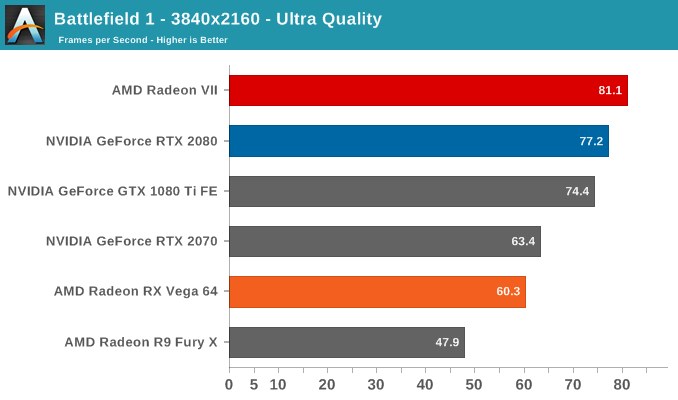
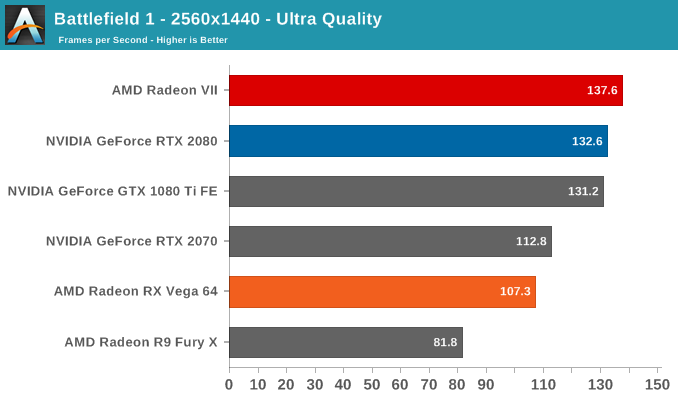
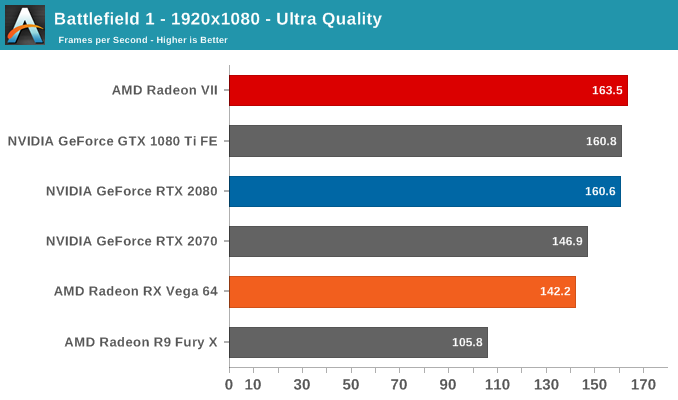
Our previous experience with Battlefield 1 shows that AMD hardware tend to do relatively well here, and the Radeon VII is no exception. Of the games in our suite, Battlefield 1 is actually only one of two games where the Radeon VII takes the lead over the RTX 2080, but nevertheless this is still a feather in its cap. The uplift over the Vega 64 is an impressive 34% at 4K, more than enough to solidly mark its position at the tier above. In turn, Battlefield 1 sees the Radeon VII meaningfully faster than the GTX 1080 Ti FE, something that the RTX 2080 needed the Founders Edition tweaks for.
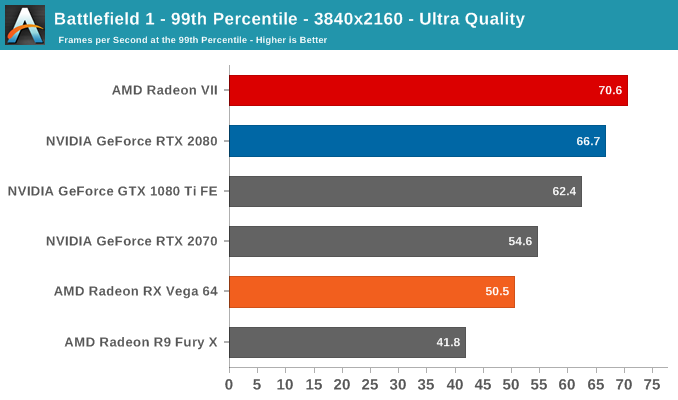
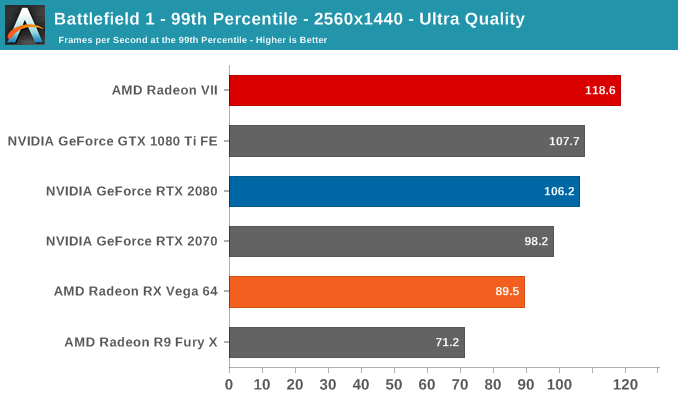
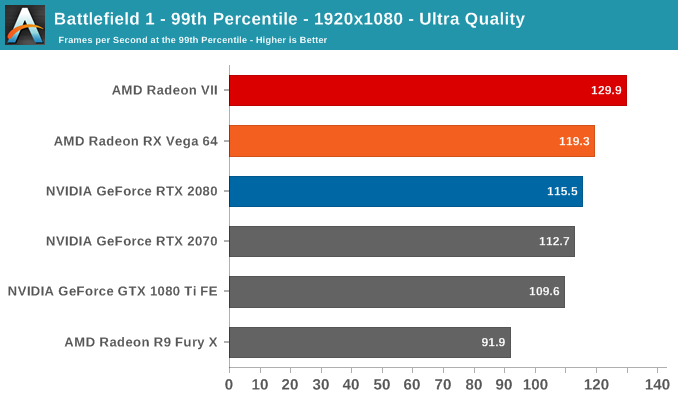
99th percentiles reflect the same story, and at 1080p the CPU bottleneck plays more of a role than slight differences of the top three cards.


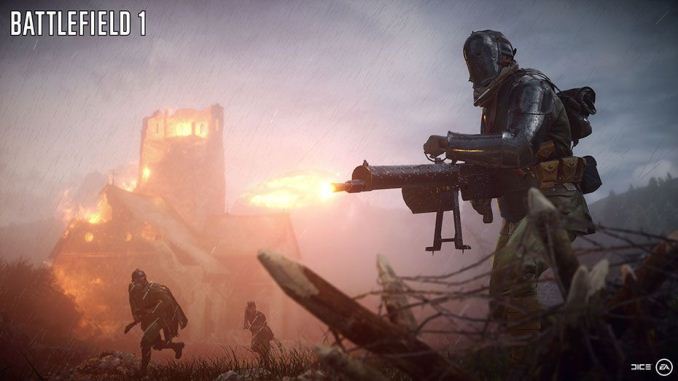








289 Comments
View All Comments
just4U - Thursday, February 7, 2019 - link
Really? I see the pre-order pricing here in Canada as 50-100 less then the 2080.Oxford Guy - Thursday, February 7, 2019 - link
I think you missed the noise-to-performance metric.This GPU isn't even close to competitive with the 2080 because of that.
just4U - Friday, February 8, 2019 - link
Sure it is.. a mild undervolt (which the cards support in wattman) is all that's needed. Lower temps lower fan noise. (..shrug)Also since many own blower style cards these 3 fan designs are usually less noise (unless maybe coil whine comes into play..)
Oxford Guy - Friday, February 8, 2019 - link
1) Undervolting is a crap shoot due to binning and other factors, not a solution that you can simply apply as a fix for every one of these cards.2) Saying that some other cards are even louder is a complete avoidance of the issue. The issue is that Nvidia is crushing the noise-to-performance metric with the 2080, according to the presented data in this article. AMD is not, at all, competitive.
eva02langley - Friday, February 8, 2019 - link
Results are there and Vega is greatly improved with undervolting. It is like this since it launch. It is related to the uarch.D. Lister - Friday, February 8, 2019 - link
Which is why I can never recommend AMD GPUs. I mean how competent can they really be if they don't even know how to set proper voltages on their GPUs?Oxford Guy - Friday, February 8, 2019 - link
It's also possible that a GPU will run at a lower voltage that what is optimal without artifacting and yet perform more slowly. Chips are typically able to do some compensation with error correction to handle inadequate voltage but the result is reduced speed.Oxford Guy - Friday, February 8, 2019 - link
You're avoiding the point.eddman - Thursday, February 7, 2019 - link
It's performing better than I expected. It doesn't fully match a 2080 but still performs good enough as a stopgap solution.A bit lower price would've been nice but I suppose it can be justified by the 16GB memory to some extent.
Oxford Guy - Thursday, February 7, 2019 - link
"It doesn't fully match a 2080 but still performs good enough as a stopgap solution."No. It sucks unless you can use the areas of compute it excels at.
There is zero reason to buy a product for gaming that is so much louder for equivalent gaming performance. None.